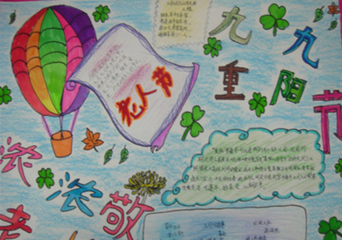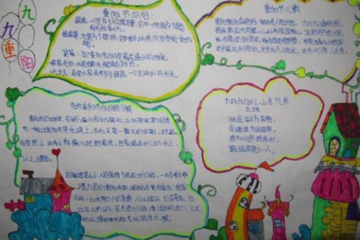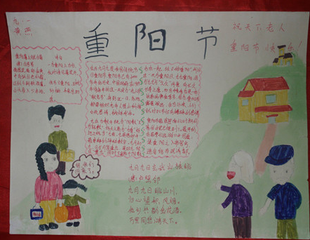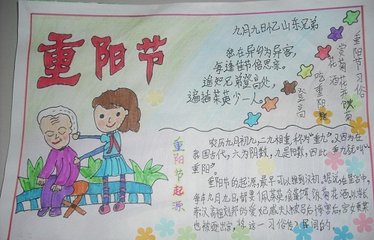对于重阳节用英语怎么翻译呢,你知道多少?下面是小编精心为您整理的“英语重阳节手抄报图片”,仅供参考,希望您喜欢!更多详细内容请继续关注我们哦。
重阳节手抄报图片

【一】

【二】

【三】

【四】
英语重阳节手抄报内容
Ninth day lunar month, twenty-nine relative weight, called "Chongjiu." And because in ancient China, six, number nine is positive, and therefore, Chongjiu called "Double Ninth Festival."
Chung Yeung Festival The earliest can be pushed to the early Han Dynasty. It is said, in a palace in each of September 9, must Peizhu cornelian cherry, food, bait bottle, drink chrysanthemum wine, in order to live longer; Han emperor Liu Bang Ai Fei Qi Furen suffer harm by Empress, the ladies have been expelled from Jiamou Palace, the private sector will be introduced this practice.
Ancient times, people are climbing on the day of the customs, so Double Ninth Festival is also called "climbing festival." Word to begin the Eastern Han Dynasty. Chinese poetry a lot of climbing, most ancestors considered; Du Fus Qilu "forever" is written Chongyang climb celebration. Wherever he went climbing, there is no uniform requirement, usually climbing a mountain, climb the tower. Also called "Double Ninth Festival". The height should be made pay attention to the nine-story, pagoda like seat, which also had two lambs made to meet the Double Ninth Festival (the sheep) meaning. The height and some are still a small red paper on the interpolation flag and candle light. This is probably as "lighting", "eat cake" instead of "ascend", with a small red paper flags instead of cornel.
Concerning the Double Ninth Chung Yeung Festival would also like to drink chrysanthemum wine, originated in the Tao. Tao to retreat known of poetry known to well-known wine, also known Aiju; effect of future generations, then a Double Ninth Shangju custom. Old scholar, more than the combined Shangju with the feast in order, and Tao closer. Northern Song Dynasty capital of Kaifeng, Chong Shangju very popular, there are many kinds of chrysanthemums at the time. Qing Dynasty, the custom is particularly Shangju prosperity, but not limited to September 9, it is still the most prosperous around Chung Yeung Festival.
Chung Yeung Festival cornel customs, has been very popular in the Tang Dynasty. The ancients considered the Chung Yeung Festival day cornel can ward off evil refuge; or wear on the arm, or for sachets to wear cornel on the inside, there are ed in the head. Mostly women, children wear, in some places, men also wear. Chung Yeung Festival Peizhu cornelian cherry, in the Jin Dynasty, Ge Hongs "Miscellanies W" in there records.
In addition to wearing the Chung Yeung Festival Cornel, also ed chrysanthemum. Tang has been so popular history. Qing Dynasty, Beijing Double Ninth Festival is the custom of the chrysanthemum leaves attached to the doors and windows, the "lift the fierce offensive to recruit good luck." This is a variation popular daisy hairpin head. Song, there will be color Zeng cut dogwood, chrysanthemums as a gift to wear.
译文:农历九月初九,二九相重,称为"重九"。又因为在我国古代,六为阴数,九是阳数,因此,重九就叫"重阳"。
重阳节的起源,最早可以推到汉初。据说,在皇宫中,每年九月九日,都要佩茱萸,食蓬饵、饮菊花酒,以求长寿;汉高祖刘邦的爱妃戚夫人被吕后惨害后,宫女贾某也被逐出宫,将这一习俗传入民间的。
古代,民间在该日有登高的风俗,所以重阳节又叫"登高节"。相传此风俗始于东汉。唐人登高诗很多,大多数是写重阳节的习俗;杜甫的七律《登高》,就是写重阳登高的名篇。登高所到之处,没有划一的规定,一般是登高山、登高塔。还有吃"重阳糕"的习俗。讲究的重阳糕要作成九层,像座宝塔,上面还作成两只小羊,以符合重阳(羊)之义。有的还在重阳糕上插一小红纸旗,并点蜡烛灯。这大概是用"点灯"、"吃糕"代替"登高",用小红纸旗代替茱萸。
重阳节还要赏菊饮菊花酒,起源于陶渊明。陶渊明以隐居出名,以诗出名,以酒出名,也以爱菊出名;后人效之,遂有重阳赏菊之俗。旧时士大夫,还多将赏菊与宴饮结合,以求和陶渊明更接近。北宋京师开封,重阳赏菊很盛行,当时的菊花就有很多种。清代以后,赏菊之俗尤为昌盛,且不限于九月九日,但仍然是重阳节前后最为繁盛。
重阳节插茱萸的风俗,在唐代就已经很普遍。古人认为在重阳节这一天插茱萸可以避难消灾;或佩带于臂,或作香袋把茱萸放在里面佩带,还有插在头上的。大多是妇女、儿童佩带,有些地方,男子也佩带。重阳节佩茱萸,在晋代葛洪《西经杂记》中就有记载。
重阳节除了佩带茱萸,也插菊花。唐代就已经如此,历代盛行。清代,北京重阳节的习俗是把菊花枝叶贴在门窗上,"解除凶秽,以招吉祥。"这是头上簪菊的变俗。宋代,还有将彩缯剪成茱萸、菊花来相赠佩带的。
推荐阅读:
小编精心推荐
英语手抄报:一年级 | 二年级 | 三年级 | 四年级 | 五年级 | 六年级
小编精心推荐